语用学课件_Pragmatics_
合集下载
英语语言学第八章 语用学 pragmatics ppt课件
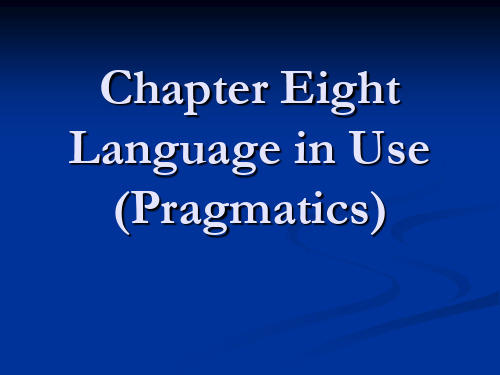
utterance, i.e. the act ostin
How to Do Things with Words (1962)
speech acts: actions performed via utterances
Constatives vs. performatives Constatives: utterances which roughly serves
Semantic meaning: the more constant, inherent side of meaning
Pragmatic meaning: the more indeterminate, the more closely related to context
2. Speech Act Theory
(ii) the relevant participants and circumstances must be appropriate.
B. The procedure must be executed correctly and completely.
C. Very often, the relevant people must have the requisite thoughts, feelings and intentions, and must follow it up with actions as specified.
Minister: addressing the groom) (Groom’s Name), do you take (Bride’s Name) for your lawful wedded wife, to live together after God’s ordinance, in the holy estate of matrimony? Will you love, honor, comfort, and cherish her from this day forward, forsaking all others, keeping only unto her for as long as you both shall live?
How to Do Things with Words (1962)
speech acts: actions performed via utterances
Constatives vs. performatives Constatives: utterances which roughly serves
Semantic meaning: the more constant, inherent side of meaning
Pragmatic meaning: the more indeterminate, the more closely related to context
2. Speech Act Theory
(ii) the relevant participants and circumstances must be appropriate.
B. The procedure must be executed correctly and completely.
C. Very often, the relevant people must have the requisite thoughts, feelings and intentions, and must follow it up with actions as specified.
Minister: addressing the groom) (Groom’s Name), do you take (Bride’s Name) for your lawful wedded wife, to live together after God’s ordinance, in the holy estate of matrimony? Will you love, honor, comfort, and cherish her from this day forward, forsaking all others, keeping only unto her for as long as you both shall live?
Lecture 3语用学课件--北外课件
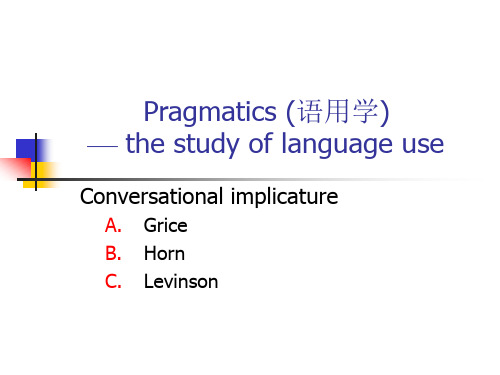
Reasoning:
Example 6:
A: I do think Mrs Jenkins is an old windbag, don’t you? B: Huh, lovely weather for March, isn’t it?
Implicature:
Mrs. Jenkins is coming, watch out! B’s answer seems to be irrelevant. But B might want to provide some relevant information, relevant in some other sense. So, the implicature.
Some other well-known Oxford philosophers:
Grice’s theory
The Co-operative Principle (合作原理):
Make your contribution such as is required, at the stage at which it occurs, by the accepted purpose or direction of the talk exchange in which you are engaged
The letter explicitly said something about Mr. Jones’s punctuality and his handwriting. But it also implicitly said that the student is not good.
The professor did not say that the student is intelligent, hardworking etc., which are normally required for a recommendation letter. What he said about the student seems to be irrelevant. This cannot be a good reference letter.
《语用学Pragmatics》课件 第十一周
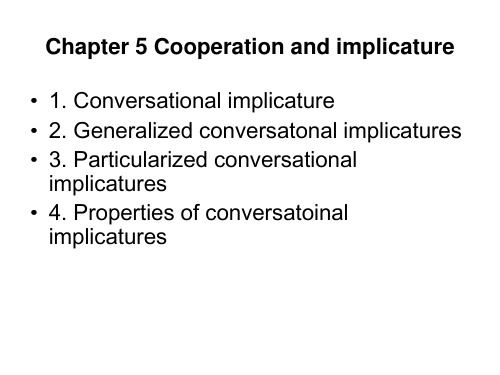
• (3) maxim of relation: Leila: Whoa! Has your boss gone crazy?
•
Mary: Let’s go get some coffee.
• (4) Bert: Do you like ice-cream?
• Ernie: Is the Pope Catholic? (+> obviously yes!)
•
He’s always ready to help.
•
He never leaves you in the lurch.
会话原则的违反和隐喻
• 反语(irony),隐喻(metaphor),夸张法 (hyperbole)和弱言法(meiosis)都是有意违 反会话的质量准则的结果.
会话原则的违反和隐喻
Chapter 5 Cooperation and implicature
• 1. Conversational implicature • 2. Generalized conversatonal implicatures • 3. Particularized conversational
implicatures • 4. Properties of conversatoinal
attendance at tutorials has been regular. However, his ability at and enthusiasm for philosophy are quite adequate for the job. • (2) You’re the cream in my coffee.------ But I’m afraid I don’t quite like cream in my coffee.
Chapter 8 Pragmatics 语用学 语言学教程 胡壮麟.ppt
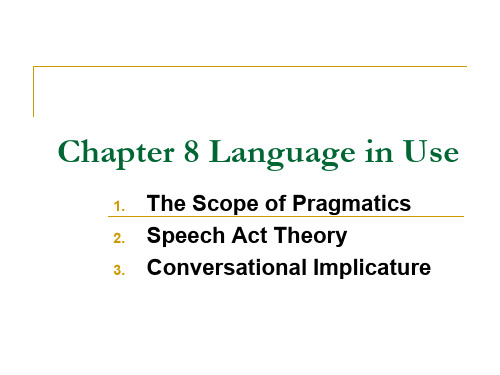
(b) In a language class where a student made a mistake, for he intended to say “tidy”.
(c) The room was wanted for a meeting.
பைடு நூலகம்
(2) I can’t work under untidy circumstances.
are acts.
8.1.1 Performatives and constatives Austin (How to Do Things with Words,
1962) Consider these sentences: a) I name this ship Elizabeth. b) I bequeath my watch to my brother. c) I now pronounce you man and wife. d) I bet you sixpence it will rain
A. (i) There must be a relevant conventional procedure, and
(ii) the relevant participants and circumstances must be appropriate.
B. The procedure must be executed (i) correctly and (ii) completely.
Possible contexts:
(a) A request to someone to tidy up the circumstances.
(b) It was an excuse for not wanting to do something there.
(c) The room was wanted for a meeting.
பைடு நூலகம்
(2) I can’t work under untidy circumstances.
are acts.
8.1.1 Performatives and constatives Austin (How to Do Things with Words,
1962) Consider these sentences: a) I name this ship Elizabeth. b) I bequeath my watch to my brother. c) I now pronounce you man and wife. d) I bet you sixpence it will rain
A. (i) There must be a relevant conventional procedure, and
(ii) the relevant participants and circumstances must be appropriate.
B. The procedure must be executed (i) correctly and (ii) completely.
Possible contexts:
(a) A request to someone to tidy up the circumstances.
(b) It was an excuse for not wanting to do something there.
pragmatics ppt

2.对语言使用间接性的解释
• SA 理论认为语言使用的间接性来源于话语的词汇) 语义 结构, 例如:Can you pass me the salt? 这句话从表面 看是询问对方是否有能力把盐递过来, 但实际的言外之力 却是请求对方做这件事, 询问是次要的言外行为, 请求才 是主要的言外行为。它把话语当作第一位的,把语境、使 用者以及交际效果当作第二位的。
PA 是一种宏观的人类交际行为理论, 以行为对交际产生的 实际效果为中心, 把言语交际看作社团成员之间的社会) 文 化行为, 突出语境特别是社会、文化语境的重要作用, 认为 在“制度化了的社会活动中”, 情景(如教学、看病、茶会) 在某种程度上已经预先规定了言语的使用, 即依照情景,交 际者彼此期待对方使用某些话语, 这些话语将被认为是可 以接受的。 在情景中实施的SA 就是PA, 但PA不一定是SA, 因为PA也 可以通过身体动作甚至“沉默”这种行为得以实施。 换句话说, PA理论将语用研究重心由微观层面的言语本身, 转向宏观层面的、以言语为主的交际行为发生的情景及其 蕴涵的行为可能性以及实际的行为和行为效果。
The differences between PA and SA
• PA is belong to macropragmatics
• 讨论的是“社会文化层面对语 言运用者言语运用的宏观调控 中所体现的语用问题” • PA 的行为则指主要通过语言进 行的社会交往活动, 它包括说 话, 也包括如表情、动作等在 内的其他交际行为, 在情景中 言语和其他交际行为的地位是 平等的。
• SA is belong to micropragmatics
• 根据徐盛桓的观点, Mey 的微 观语用学是在“话语运用的层 次”上, “围绕着对语言符号 在言谈交际中的指称和意义中 的‘意图’的理解而展开的语 用学课题的讨论” • SA的行为专指说话, 即使用语y认为SA 的解释方向是由里及外的, 即从话语出发, 考察语言的使 用和理解, 而PA 的解释方向则是由外及里的, 即从语言使用和理解 的情景出发, 考察人们的交际自由与制约以及因之而决定的交际行为 的可能性和实际行为。 • SA以话语为中心,把言语交际这种人类活动完全看作个人行为, Mey认 为这种单纯的语言或思维理论不能解释具体情景中语言使用者的行为, 而对交际做语用考察时必须时刻考虑在特定情景中交际者各种交际行 为的可能性, 这就必然引出一个结论即必须用行为理论才能真正解释 语言使用现象, 或者说语用理论本质上必须是行为理论, PA就是这样 一种行为理论。
《语用学Pragmatics》课件 第四周
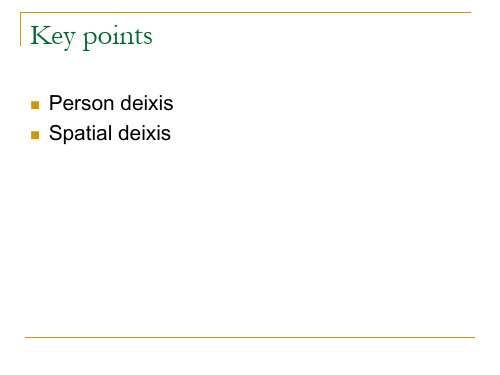
addressee. Inclusive “we”: speaker and addressee included.
examples
(1)1. Debby: Go anywhere today? 2. Dan: Yes, we went down to Como. Up by bus, and back by hydrofoil.
Key points
Person deixis Spatial deixis
Difficult points
Deictic projection Non-deictic usage of the dictic expressions Psychological distance
2.1 Deixis
编码时间:(Coding time, 简称CT) 接收时间:(receiving time, 简称RT) 时间指和空间指的重要区别:CT和RT是一致
的,但在语言活动中,交际双方却永远不可能 处于同一空间位置。
Deictic center
说 ____go______take________>there
Psychological distance
Speaker may also wish to mark somethng that is physically close (for example, a perfume being sniffed by the speaker) s psychologically distant ‘I don’t like that’.
Speakers also seem to be able to project themselves into other locations prior to actually being in those locations:
examples
(1)1. Debby: Go anywhere today? 2. Dan: Yes, we went down to Como. Up by bus, and back by hydrofoil.
Key points
Person deixis Spatial deixis
Difficult points
Deictic projection Non-deictic usage of the dictic expressions Psychological distance
2.1 Deixis
编码时间:(Coding time, 简称CT) 接收时间:(receiving time, 简称RT) 时间指和空间指的重要区别:CT和RT是一致
的,但在语言活动中,交际双方却永远不可能 处于同一空间位置。
Deictic center
说 ____go______take________>there
Psychological distance
Speaker may also wish to mark somethng that is physically close (for example, a perfume being sniffed by the speaker) s psychologically distant ‘I don’t like that’.
Speakers also seem to be able to project themselves into other locations prior to actually being in those locations:
语用学课件_Pragmatics_

Number No number category : (Piraha, Kawi) Singular-plural: (Chinese, West Dani ) Singular-dual-paucal-plural: (Yimas, Murik, Meryam Mir)
Person 1 2 3
2.1 Deictic vs non-deictic usages
Deictic usage : what the deictic expression refers to depend on the specific context it occurs. non-deictic usage: non-deictic expression is an expression for which you don’t need context to understand it since it doesn’t refer to anything in particular, on the contrary, it is used in a general sense.
a. He came here one hour ago. b. You can’t lose what you never had.= c. One can’t lose what one /he never had. a, which contains deictic expressions, is context dependent. In isolation, the sentence doesn’t convey much information because we have no idea about who came to what place at what time .He, here, and one hour ago being deictic items. While in b, the second-person pronouns are non-deictic expressions. you can be replaced with one.
语言学--Pragmatics ppt课件

15
ppt课件
• Speech acts is a term derived from the work of the philosopher J. L. Austin (1962) and now used to refer to a theory which analyzes the role of utterances in relation to the behavior of the speaker and the hearer in interpersonal communication. It aims to answer the question “What do we do when using language?”
12
ppt课件
6.2.3 Anaphora
• You need to know: definition of anaphora, antecedent, anaphor indirect anaphora and direct anaphora
13
ppt课件
6.2.4 Presupposition
• a. Can I look at your Shakespeare? • b. Sure, it’s on the shelf over there. • You need to know • inference: process • reference: the act
9ቤተ መጻሕፍቲ ባይዱ
ppt课件
6.2.2 Deixis
• You need to know: definition of deixis five types of deixis
10
ppt课件
definition of deixis
- 1、下载文档前请自行甄别文档内容的完整性,平台不提供额外的编辑、内容补充、找答案等附加服务。
- 2、"仅部分预览"的文档,不可在线预览部分如存在完整性等问题,可反馈申请退款(可完整预览的文档不适用该条件!)。
- 3、如文档侵犯您的权益,请联系客服反馈,我们会尽快为您处理(人工客服工作时间:9:00-18:30)。
John got home late and he was very tired. I was born in London and have lived there ever since. Here is the 9 o’clock news… I bet you haven’t heard this story.
(we-inclusive-of-addressee) 我们 (we-exclusive-of –addressee ) 咱们 (we-inclusive-of-addressee)
Let’s
Gender
person
first
second
third
male
ぼく おれ
おまえ きみ
かれ
female
(1) I am hungry. (2) this is good for your health. 如果这句话是我说的,当然是说我饿,但要是 出自你的口,饿的就是你而不是我了 this, your 也是不稳定的,this 可能指这项运动而不是那项 运动,或指这种药物而不是另一种药物。如果我 对你说的, your 指你的健康,如果我是对张三 说的,我指的就是张三的健康。(何自然,24)
Pull the trigger now! I usually go to school at 8 o’clock. 昨天、今天、明天 昨天下雨了。 今天星期天。 我们的明天会更好。
Coding time (CT): the moment of utterance; Receiving time(RT): the moment of reception. Deictic simultaneity: RT is identical to CT => CT =RT It is warm outside. letter writing, or pre- recording of media programmes
=> deictic centre remains on the speaker and CT: This interview is being recorded today, Wednesday 3 July, to be relayed on Sunday 7 July. => deictic centre is projected on the addressee and RT: This interview was recorded last Wednesday, 3 July, to be relayed today, Sunday 7 July (Levinson 1983: 73--4, Fillmore 1997: 67-8).
Number No number category : (Piraha, Kawi) Singular-plural: (Chinese, West Dani ) Singular-dual-paucal-plural: (Yimas, Murik, Meryam Mir)
Person 1 2 3
Deictic expression
Deictic use Gestural symbolic anaphoric cataphoric
Non-deictic use
Classification of deixis
The traditional ones: Person Deixis Time Deixis Space Deixis Two lately added ones (Fillmore, 1975): Discourse deixis Social deixis
We
Shall we do it now? ( we-exclusive-of –addressee ) We should go to bed now. (we-inclusive-of-addressee)
Us
Let us ( we-exclusive-of –addressee )
a. He came here one hour ago. b. You can’t lose what you never had.= c. One can’t lose what one /he never had. a, which contains deictic expressions, is context dependent. In isolation, the sentence doesn’t convey much information because we have no idea about who came to what place at what time .He, here, and one hour ago being deictic items. While in b, the second-person pronouns are non-deictic expressions. you can be replaced with one.
Deixis
Zhang Jiyuan
I.
Definition II. The usage of deixis III. Basic categories of deixis
What is deixis?
The term ‘deixis’ is derived from the Greek word meaning ‘to show’ or ‘to point out’. It can be defined as the phenomenon whereby features of context of utterance or speech event are encoded by lexical and/or grammatical means in a language.(Yan huang,132)
singular wo ni ta
plural women nimen tamen
Within the plural, we should make a distinction between we-inclusive-of-addressee and weexclusive-of –addressee.
Time Deixis
Time deixis is concerned with the encoding of temporal points and spans relative to the time at which an utterance is produced in a speech event. Temporal points or spans:
The encoding of time deixis: (1) deictic adverbs of time and (2) tense. Deictic adverbs of time: now, today proximal time then, soon, yesterday, tomorrow, recently ,etc distal time
Pre-emptive usage(时间指示语的先用现象): 在同一时间的情况下,先用那些笼统的,不确定 的时间指示语,而不用那些表达确定时间或绝对 时间的指示语。 a1.Do it at 10:36. a2.Do it now. b1. I’ll see you on Friday. b2. I’ll see you today.
わたし わたくし
あなた
かのじょ
(2)Vocatives
Vocatives are noun phrases referring to the addressee, but are not syntactically or semantically incorporated as the arguments of a predicate. Calls/summonses (呼唤语 utterance-initial) a. Hey Daddy, look, a spider in the corner! b. Ladies and gentlemen, may I have your attention, please? c. Doctor William, do you think I need a blood test? Addresses (称唤语 parenthetical) a. I’m afraid, dear, you’ll get lost. b. Tea or coffee, sir?
Hello, how are things there?
I know more about pragmatics now than I did before.
Within non-deictic use, there is a distinction between anaphoric( 前 照 应 ) and cataphoric (后照应)use .
Person
Personal pronouns exhibit a three way distinction of first, second, third person.
First-person Second person Third person
[+speaker] [+addressee] [-speaker, -addressee]
2.2 Gestural vs symbolic usages
Within deictic use, a further distinction can be drawn between gestural and symbolic use(Fillmore 1971) . Gestural use can be properly interpreted only by a direct, moment by moment monitoring of some physical aspects of the speech event. For example:
(we-inclusive-of-addressee) 我们 (we-exclusive-of –addressee ) 咱们 (we-inclusive-of-addressee)
Let’s
Gender
person
first
second
third
male
ぼく おれ
おまえ きみ
かれ
female
(1) I am hungry. (2) this is good for your health. 如果这句话是我说的,当然是说我饿,但要是 出自你的口,饿的就是你而不是我了 this, your 也是不稳定的,this 可能指这项运动而不是那项 运动,或指这种药物而不是另一种药物。如果我 对你说的, your 指你的健康,如果我是对张三 说的,我指的就是张三的健康。(何自然,24)
Pull the trigger now! I usually go to school at 8 o’clock. 昨天、今天、明天 昨天下雨了。 今天星期天。 我们的明天会更好。
Coding time (CT): the moment of utterance; Receiving time(RT): the moment of reception. Deictic simultaneity: RT is identical to CT => CT =RT It is warm outside. letter writing, or pre- recording of media programmes
=> deictic centre remains on the speaker and CT: This interview is being recorded today, Wednesday 3 July, to be relayed on Sunday 7 July. => deictic centre is projected on the addressee and RT: This interview was recorded last Wednesday, 3 July, to be relayed today, Sunday 7 July (Levinson 1983: 73--4, Fillmore 1997: 67-8).
Number No number category : (Piraha, Kawi) Singular-plural: (Chinese, West Dani ) Singular-dual-paucal-plural: (Yimas, Murik, Meryam Mir)
Person 1 2 3
Deictic expression
Deictic use Gestural symbolic anaphoric cataphoric
Non-deictic use
Classification of deixis
The traditional ones: Person Deixis Time Deixis Space Deixis Two lately added ones (Fillmore, 1975): Discourse deixis Social deixis
We
Shall we do it now? ( we-exclusive-of –addressee ) We should go to bed now. (we-inclusive-of-addressee)
Us
Let us ( we-exclusive-of –addressee )
a. He came here one hour ago. b. You can’t lose what you never had.= c. One can’t lose what one /he never had. a, which contains deictic expressions, is context dependent. In isolation, the sentence doesn’t convey much information because we have no idea about who came to what place at what time .He, here, and one hour ago being deictic items. While in b, the second-person pronouns are non-deictic expressions. you can be replaced with one.
Deixis
Zhang Jiyuan
I.
Definition II. The usage of deixis III. Basic categories of deixis
What is deixis?
The term ‘deixis’ is derived from the Greek word meaning ‘to show’ or ‘to point out’. It can be defined as the phenomenon whereby features of context of utterance or speech event are encoded by lexical and/or grammatical means in a language.(Yan huang,132)
singular wo ni ta
plural women nimen tamen
Within the plural, we should make a distinction between we-inclusive-of-addressee and weexclusive-of –addressee.
Time Deixis
Time deixis is concerned with the encoding of temporal points and spans relative to the time at which an utterance is produced in a speech event. Temporal points or spans:
The encoding of time deixis: (1) deictic adverbs of time and (2) tense. Deictic adverbs of time: now, today proximal time then, soon, yesterday, tomorrow, recently ,etc distal time
Pre-emptive usage(时间指示语的先用现象): 在同一时间的情况下,先用那些笼统的,不确定 的时间指示语,而不用那些表达确定时间或绝对 时间的指示语。 a1.Do it at 10:36. a2.Do it now. b1. I’ll see you on Friday. b2. I’ll see you today.
わたし わたくし
あなた
かのじょ
(2)Vocatives
Vocatives are noun phrases referring to the addressee, but are not syntactically or semantically incorporated as the arguments of a predicate. Calls/summonses (呼唤语 utterance-initial) a. Hey Daddy, look, a spider in the corner! b. Ladies and gentlemen, may I have your attention, please? c. Doctor William, do you think I need a blood test? Addresses (称唤语 parenthetical) a. I’m afraid, dear, you’ll get lost. b. Tea or coffee, sir?
Hello, how are things there?
I know more about pragmatics now than I did before.
Within non-deictic use, there is a distinction between anaphoric( 前 照 应 ) and cataphoric (后照应)use .
Person
Personal pronouns exhibit a three way distinction of first, second, third person.
First-person Second person Third person
[+speaker] [+addressee] [-speaker, -addressee]
2.2 Gestural vs symbolic usages
Within deictic use, a further distinction can be drawn between gestural and symbolic use(Fillmore 1971) . Gestural use can be properly interpreted only by a direct, moment by moment monitoring of some physical aspects of the speech event. For example:
